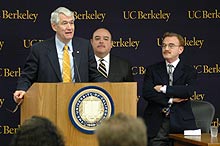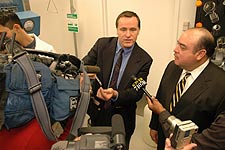Berkeleyan
Chancellor Birgeneau named to stem-cell oversight committee by Bustamante
Personally familiar with the effects of one grave disease likely to be targeted by revolutionary research, he pledges $3 billion in funding will be ‘well spent’
![]()
| 17 November 2004
Chancellor Robert J. Birgeneau was named on Monday to a committee charged with overseeing the implementation of California’s new $3-billion stem-cell-research effort, approved by the voters with the passage on Nov. 2 of Proposition 71.
“I’m pleased and honored by this appointment,” Birgeneau said, after Lt. Gov. Cruz Bustamante made the announcement at a press conference at the Hearst Memorial Mining Building. “This is an important responsibility, and there is much work to be done.”
Bustamante said he chose Birgeneau because “the UC Berkeley life sciences faculty is among the most distinguished in the country” and the chancellor is “a world figure in physics.”
 At a press event earlier this week, Chancellor Birgeneau said he will be an advocate for the public as a member of California’s new stem-cell-research oversight committee. Looking on were Lt. Gov. Cruz Bustamante (center), who announced Birgeneau's appointment to the 29-member panel, and Professor of Integrative Biology Randy Schekman. (Steve McConnell photo) |
Birgeneau told print and broadcast reporters during a question-and-answer session that his background in physics — and not the biological sciences — would allow him to be objective and fair on the committee.
“I will ensure that the money is well and ethically spent,” Birgeneau said. “We need to put together a team of experts and put together lists of what is most promising.”
When asked how people would be assured that he would put the state’s interests before UC Berkeley’s, Birgeneau said, “First, they have my word. That’s the most important thing. Second, I’m one of 29 people on the committee.”
Proposition 71, a $3-billion bond measure approved by 59 percent of the voters, sets up a new agency — the California Institute for Regenerative Medicine — modeled as a state version of the National Institutes of Health. The bond measure was put forward in the wake of the Bush administration’s decision to limit federal funding for any research that involves the destruction of human embryos, the source of some stem cells.
Prop. 71 backers argued that existing stem-cell colonies used for research are unreliable, are contaminated by the mouse cells used as a medium for growth, and cannot be propagated.
 As part of Monday’s press event announcing the appointment of Chancellor Birgeneau to the new state panel overseeing implementation of Proposition 71, Kevin Healy (center), professor of bioengineering and materials science and engineering, demonstrated a hydrogel used for stem-cell research. At right is California Lt. Gov. Cruz Bustamante. (Steve McConnell photo) |
“Once again, we are facing a revolutionary technology, and California is leading the way,” Schekman said.
Speaking from experience
Both Birgeneau and Schekman said they had personal brushes with the illnesses targeted by stem-cell researchers. Schekman said his wife has Parkinson’s disease, and Birgeneau said he had a close colleague suffer and die from Amyotrophic Lateral Sclerosis, commonly known as ALS or Lou Gehrig’s disease.
“We all have family and friends who suffer from these diseases,” Schekman said. “Now, we have the prospect of not just palliative care (such as treating diabetes with injections), but cures.”
The oversight committee will manage the institute and appoint the committee responsible for parceling out the research grants. Bustamante, Birgeneau, and Schekman stressed repeatedly on Monday that although the measure has controversial aspects, the initiative spells out how to handle some of these situations. For example, cloning is specifically banned, and the proposition requires a committee of outside experts with no financial stake in the outcome to be involved.
“I’m confident that this proposition and its implementation will be held to the strictest guidelines,” Schekman said. “We’re eager to cooperate, we’re also eager to begin to recruit … and we’re eager to begin.”
Bustamante emphasized that the measure is already attracting outside investment and talent to the state. “It’s this century’s Gold Rush,” the lieutenant governor said. “Everyone is coming to California.”
Schekman said one of the next major steps is a meeting in early December, at the National Academy of Sciences facility at UC Irvine, with grant agencies and other grant experts who will advise involved parties on the best ways to analyze proposals and distribute the funds.
Bustamante, Gov. Arnold Schwarzenegger, state Controller Steve Westly, and state Treasurer Phil Angelides will each appoint five members to the oversight committee; the five UC medical schools will appoint one member each; and the leaders of the state Assembly and Senate will appoint two people each. Once formed, that group of 27 will select two more members to be chairperson and vice chairperson.
The lieutenant governor’s appointment of Birgeneau fulfills a committee requirement that one of its members be an executive officer of a California university with a recent proven history administering scientific and/or medical research grants. That university also must be one of the 10 U.S. universities with the highest number of life-science patents or with faculty members who are members of the National Academy of Sciences.
UC Berkeley administers scientific and medical research grants and contracts in an average range exceeding $100 million yearly. It also has 125 faculty members who have been named to the NAS.
Also on Monday, Berkeley officials gave Bustamante and reporters a tour of a lab in the mining building that is developing a synthetic material that would be a better medium on which to grow stem cells than the current medium, which uses mouse cells and is vulnerable to contamination.
Kevin Healy, a professor of bioengineering and materials science and engineering, used a syringe to manipulate the hydrogel, a sticky substance similar to contact-lens material, and showed on a computer screen how stem cells are grown on it. To do his research, he currently uses a Bush administration-approved stem-cell line that is stored at UC San Francisco.

